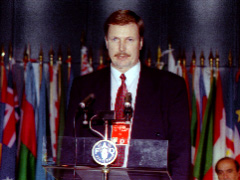


LATVIA - LETTONIE - LETONIA | ||
His Excellency Roberts Dilba, Deputy Prime Minister and Minister for Agriculture of the Republic of Latvia | ||

It is a great honour for me to address you from the high rostrum of the World Food Summit. The country I represent is the Republic of Latvia. Latvia is a small country on the shores of the Baltic Sea that, following fierce battles for freedom, emerged in 1918 as an independent State. The year of 1991 brought Latvia its second independence and its Statehood was restored. After the restoration of the Statehood of Latvia, we found ourselves in a deep recession affecting manufacturing, farming and other sectors of the economy. It is going to take some time to improve the situation. It is general knowledge that the objective of the country's farming activities is to supply its population with food products. Land reform in Latvia is well under way and the first phase of the reform is drawing to a close. Seventy-five thousand private farms have been established with an average land area of 20 hectares. The gross output of agricultural production in current prices is US$ 900 million. Today, farm produce in my country accounts for 70 to 80 percent of the demand for food products. The rest, primarily cereals, oils and some kinds of meat are imported. In the context of this Summit, I can say that people in my country are not starving in the direct sense of the word. Nevertheless, concern can be aroused in respect of the quality, nutritional value and balance of the food consumed. At the same time, in view of the Rome Declaration being adopted here at this Summit and being aware of the bitter fact that 800 million people are starving, and this we know is occurring predominantly in developing countries, we also know that there are ethnic conflicts in Zaire and in Rwanda and these are causing movements of refugees with their ensuing famines affecting more than one million people. The situation in my country is more or less normal and as Minister of Agriculture I can say that despite the tough economic situation and people suffering deprivation, the population is not starving in Latvia. On the other hand, no one can remain indifferent to the suffering of millions of people including children, since the primary and essential right to daily bread is denied them. In contrast, the arable land in my country has gradually become overgrown with thistles and bushes and the number of livestock has declined. This is alarming but the situation is not hopeless. A solution must be and will be found and we are certain that we shall be able to find a remedy to this situation. Furthermore, since the conditions for agricultural production are excellent in Latvia and we only have technological problems right now, we believe that we can still make our soil productive if we can attract more investment into Latvia, more than what we have received in the past few years - we shall be able to produce food of high quality not only for our population but we shall also be able to contribute to the fight against starvation and food insecurity. We have already made preliminary steps towards the implementation of this objective and as a result we have received support from the World Bank and from the PHARE Programme. A credit system for small and medium farmers and entrepreneurs has been set up together with the Agricultural Advisory Centre that is represented in many regions of our country. By this I wish to emphasize that Latvia is investment worthy and I am sure that investments will provide rich returns. As the Head of the Delegation of the Republic of Latvia, I fully agree with the theses of the Rome Declaration on World Food Security and I support the World Food Summit Plan of Action. Within the limits of its capacity, Latvia is prepared to contribute to finding ways to resolve food security problems. I wish for those present, and all the countries represented here, to be successful in their fight against hunger and malnutrition. | ||
|
|
|
|

 |